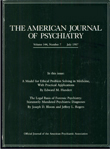Cultural and Linguistic Barriers to Mental Health Service Access: The Deaf Consumer's Perspective
Abstract
OBJECTIVE: The authors investigated knowledge, attitudes, and beliefs about mental illness and providers held by a group of deaf adults. METHOD: The American Sign Language interviews of 54 deaf adults were analyzed. RESULTS: Recurrent themes included mistrust of providers, communication difficulty as a primary cause of mental health problems, profound concern with communication in therapy, and widespread ignorance about how to obtain services. CONCLUSIONS: Deaf consumers' views need due consideration in service delivery planning. Outreach regarding existing programs is essential. (Am J Psychiatry 1998; 155:982–984)



